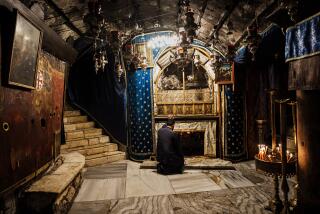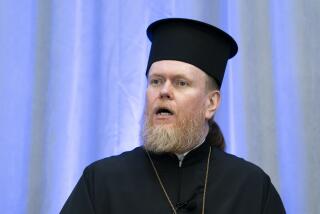After Attacks, Christians Feel Threatened in Pakistan : Asia: Leaders of religious minority denounce government in Muslim nation for failing to repeal blasphemy law.
- Share via
NEW DELHI — Pakistan’s small Christian minority has been plunged into fear and uncertainty by the shooting ambush of three members charged with defaming Islam and by the government’s reluctance to repeal a law punishing anti-Muslim blasphemy with death.
“The Christians are afraid. There’s a great sense of insecurity,” Bishop Samuel Azariah of the United Church of Pakistan said in a weekend telephone interview.
Last week, Azariah and fellow Protestant and Roman Catholic prelates led thousands of Christians on a march through Lahore to demand that the government of Prime Minister Benazir Bhutto nullify a law mandating capital punishment for anyone “who defiles the sacred name of the holy prophet Mohammed.”
In the port city of Karachi, a similar demonstration staged by an estimated 3,000 Christians was tear-gassed by police.
“As long as the government doesn’t react, there will be other protests,” Azariah said. “Christians are afraid, but they also want to register their protest and their concern.”
Leaders of Pakistan’s Christians, who estimate their flock at about 3 million of Pakistan’s 125 million people, say the anti-blasphemy law in the officially Muslim country is being used to persecute Christians or settle personal scores.
If the government does not take action by Saturday, Christians will stage hunger strikes, work stoppages or other protests, said Azariah, whose church represents an amalgamation of Protestant denominations including Anglicans, Methodists and Scottish Presbyterians.
The concerns arose April 5, when gunmen attacked three Christians, accused of scrawling anti-Muslim slogans on mosque walls, as they left a Lahore court.
Manzoor Masih, 40, was killed. One co-defendant was shot half a dozen times in the stomach but is in no danger because no vital organs were struck, Azariah said. The third, an illiterate boy of 13, was shot in the wrist and hand.
From Bhutto on down, Pakistani authorities have kept mute about the attack, Azariah charged.
“No official condemnation has been stated at either the national or the provincial level,” the bishop said. “Neither Mrs. Bhutto, nor the president nor the (provincial) chief minister has condemned the act, and that disturbs us further.”
When no arrests followed the ambush, which took place in broad daylight before witnesses, Azariah said the Christians decided to stage the marches.
The death penalty for blasphemy, made mandatory in 1991 under Pakistan’s previous government, has never been applied, although Azariah said there have been at least three cases in which those accused of the crime were killed or died in suspicious circumstances.
One victim, a Christian schoolteacher, was stabbed to death after a rumor spread that he had spoken an insulting word against Mohammed.
Bhutto espouses a tolerant and liberal interpretation of Islam. Before coming to power in October, she talked about doing away with legislation that enacts Muslim religious norms into law. In Islamabad, there have been rumors of impending changes in the blasphemy law, including an amendment ordering 10 years’ imprisonment for anyone making false accusations and a softer penalty for people who may have insulted Islam’s founder unintentionally.
But in a country whose very reason for creation was the Muslim faith and where Christians are legally deemed a separate electorate, the issue is politically dangerous. Journalist Khaled Ahmed, who has followed the controversy for the Pakistani publication Friday Times, believes Bhutto has gotten cold feet.
“There is a deep cleavage in Pakistan,” he said. “The opposition will probably join up with the (Muslim) clergy on this. The government is scared. They now say they will not amend the law.”
Last week, as the Christians prepared for their marches, the provincial assembly in Lahore unanimously passed a resolution calling on the national government to preserve the death penalty for blasphemy.
A recent decision by the Lahore high court may signal more trouble for Pakistan’s Christians, Ahmed said. It ruled that the anti-blasphemy law in fact embraces all prophets, not just Mohammed.
That could mean prosecuting people as blasphemers if they spread the Old Testament stories that David was an adulterer or Noah a drunkard.
“We fear there may be more litigation against the Christian community,” Ahmed said.
In a sign of solidarity with the Christian minority, representatives of secular organizations, including the Pakistani Human Rights Commission, the Women’s Action Forum, War Against Rape and the Committee for Justice and Peace, took part in the funeral procession for Masih.
Azariah also said authorities in Lahore seemed to be taking steps to limit interfaith tensions. Muslim activists planned a demonstration today, but a ban was published Saturday on the display of posters and banners at the site, he said.
More to Read
Sign up for Essential California
The most important California stories and recommendations in your inbox every morning.
You may occasionally receive promotional content from the Los Angeles Times.













